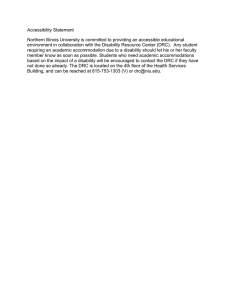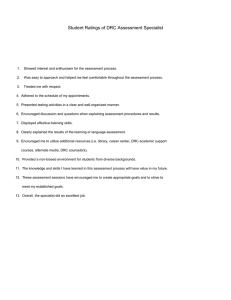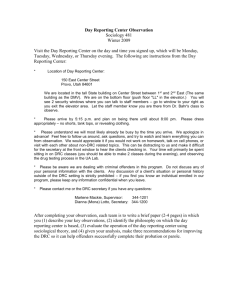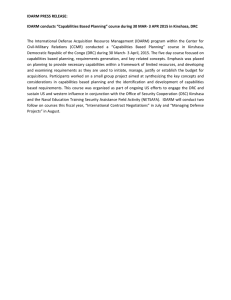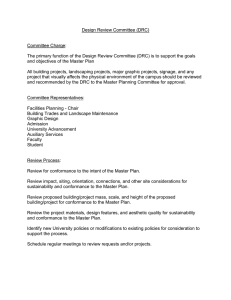ADVANCE QUESTIONS TO THE DEMOCRATIC REPUBLIC OF THE CONGO BELGIUM
advertisement
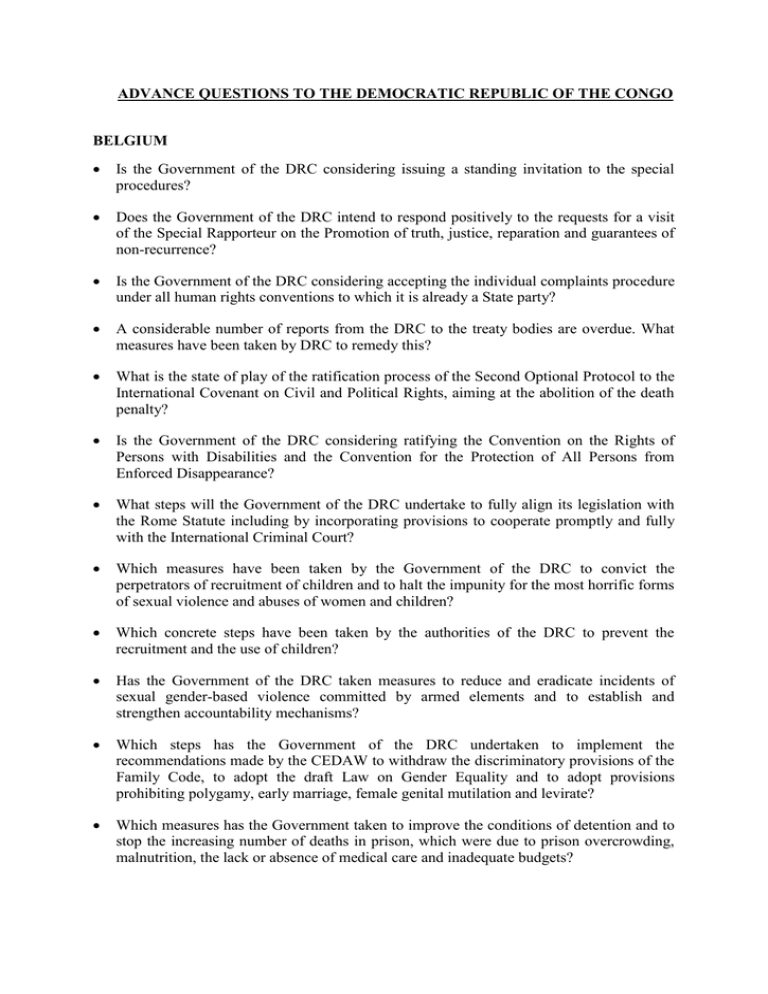
ADVANCE QUESTIONS TO THE DEMOCRATIC REPUBLIC OF THE CONGO BELGIUM Is the Government of the DRC considering issuing a standing invitation to the special procedures? Does the Government of the DRC intend to respond positively to the requests for a visit of the Special Rapporteur on the Promotion of truth, justice, reparation and guarantees of non-recurrence? Is the Government of the DRC considering accepting the individual complaints procedure under all human rights conventions to which it is already a State party? A considerable number of reports from the DRC to the treaty bodies are overdue. What measures have been taken by DRC to remedy this? What is the state of play of the ratification process of the Second Optional Protocol to the International Covenant on Civil and Political Rights, aiming at the abolition of the death penalty? Is the Government of the DRC considering ratifying the Convention on the Rights of Persons with Disabilities and the Convention for the Protection of All Persons from Enforced Disappearance? What steps will the Government of the DRC undertake to fully align its legislation with the Rome Statute including by incorporating provisions to cooperate promptly and fully with the International Criminal Court? Which measures have been taken by the Government of the DRC to convict the perpetrators of recruitment of children and to halt the impunity for the most horrific forms of sexual violence and abuses of women and children? Which concrete steps have been taken by the authorities of the DRC to prevent the recruitment and the use of children? Has the Government of the DRC taken measures to reduce and eradicate incidents of sexual gender-based violence committed by armed elements and to establish and strengthen accountability mechanisms? Which steps has the Government of the DRC undertaken to implement the recommendations made by the CEDAW to withdraw the discriminatory provisions of the Family Code, to adopt the draft Law on Gender Equality and to adopt provisions prohibiting polygamy, early marriage, female genital mutilation and levirate? Which measures has the Government taken to improve the conditions of detention and to stop the increasing number of deaths in prison, which were due to prison overcrowding, malnutrition, the lack or absence of medical care and inadequate budgets? What steps has the Government of the DRC taken to halt the incidents of intimidation, death threats, arbitrary arrests and other human rights violations committed against human rights defenders and journalists by State officials and armed groups? Which measures has the Government taken to criminalize acts of violence against children accused of witchcraft and to organize a national campaign of awareness-raising on the issue? CZECH REPUBLIC When will the Government of the Democratic Republic of the Congo establish an independent national preventive mechanism in accordance with the Optional Protocol to the Convention against Torture and Other Cruel, Inhuman or Degrading Treatment or Punishment? Does the Government consider abolishing the death penalty? If so, in what timeframe? What measures have been taken to stem the involvement of members of the national defence and security forces in sexual violence against women, especially in the East of the country? How does the Government implement numerous critical recommendations of the Committee on the Elimination of Discrimination against Women related to the protection of women’s rights? Was the draft Family Code prepared in accordance with the CEDAW recommendations? Does the Government consider adopting new Law on Gender Equality as recently recommended by the CEDAW? Has the Government implemented recommendations of international election observation missions observing the 2011 presidential and legislative elections, especially the ones relating to the equal political participation? What concrete steps have been undertaken in this regard? GERMANY The protection of civilians, in particular of women and children, remains of serious concern in the DRC. In this context, reports of crimes and sexual violence committed by members of State security forces and armed groups continue to surface. What concrete measures has the DRC adopted, for instance in the field of training and education, to further enhance awareness among all members of the police and army, regardless of rank, to protect civilians and their human rights? What steps has the government taken to strengthen the judicial system with a view to fight corruption, end impunity of those accountable and ensure international fair trial standards? In 2009, Germany recommended that the DRC strengthen its efforts to reform the FARDC and to improve military justice. So far, little progress has been made on a comprehensive reform of the military. Does the DRC have concrete plans to reform the FARDC? In 2009, the DRC has adopted a national strategy to combat sexual and gender-based violence. Given the many worrisome trends in the region, what concrete measures and steps have been taken by the Congolese government to ensure the implementation of the national strategy and combat human rights violations committed on the basis of gender, gender identity, or sexual orientation? How did the DRC involve civil society in the preparation of its UPR process? NETHERLANDS Can the government of the DRC indicate when legislation in accordance with the Rome Statute of the International Criminal Court will be in place? Can the government indicate when there will be a decision on the proposal for the establishment of chambres mixtes? Will the government develop effective mechanisms to eliminate sexual violence, in consultation with groups representing women’s interests, to prevent violence against women and girls, to facilitate prosecution of perpetrators, and to provide full reparation for victims and survivors, in line with United Nations (UN) Security Council Resolutions 1325 of 2000 on women, peace, and security; 1820 of 2008; and 2106 of 2013, which are aimed at preventing and protecting women and girls from sexual violence in armed conflict and post-conflict situations? Can the government indicate how it will ensure that human rights defenders can conduct their work in a conducive legal, institutional and administrative framework. SWEDEN How will the Government of DR Congo ensure that the Family Code currently debated in parliament does not give unequal status – legally and normatively – to Congolese women and men? How will the Government of DR Congo ensure that human the rights violations that have accompanied military offensives and election processes in the past will be prevented in the ongoing and planned military operations and in the coming elections? UNITED KINGDOM It is encouraging that reports indicate that over the period since the last UPR a large number of children have been released from the Congolese Armed Forces and freed from armed groups. We welcome the signing of the action plan in 2012. However, we continue to remain concerned about the situation of children in the DRC, particularly those subjected to child recruitment, forced labour and sexual violence. What arrangements does the Government of the DRC have in place to ensure that children’s rights are protected at all times, and that those children involved with armed groups are treated and reintegrated appropriately? We welcome the announcement by President Kabila of a Personal Representative on the fight against child recruitment and sexual violence, and encourage their timely appointment. We also welcomed the government’s participation in the recent high level dialogue on sexual violence in DRC, along with their stated commitment to fight this scourge and to improve the wider situation of Congolese women and girls. Impunity was highlighted as a key challenge: what concrete steps will the government be taking in the next year to ensure that perpetrators of crimes of sexual violence are brought to justice? And what steps will they take to improve the protection of witnesses and survivors? The death penalty remains in place in DRC, although there is a moratorium on its use. One of the recommendations from the previous UPR that was accepted by the DRC was a commitment to working towards the removal of the death penalty from the statute books. The UK has a principled opposition to the death penalty in all its forms, and calls for the government of DRC to formally and conclusively abolish it. What progress has the Government of the DRC made to this end and what plans does the Government of the DRC have for abolition? As part of the Peace, Security and Cooperation Framework (PSCF) Agreement, signed in Addis Ababa in February 2013, a commitment was made “to neither harbour nor provide protection of any kind to persons accused of war crimes, crimes against humanity, acts of genocide or crimes of aggression, or persons falling under the United Nations sanctions regime” as well as “to facilitate the administration of justice through judicial cooperation within the region.” What plans does the government of DRC have for working with the region to ensure that the leadership of rebel groups and those accused of human rights abuses in eastern DRC are brought to justice?
